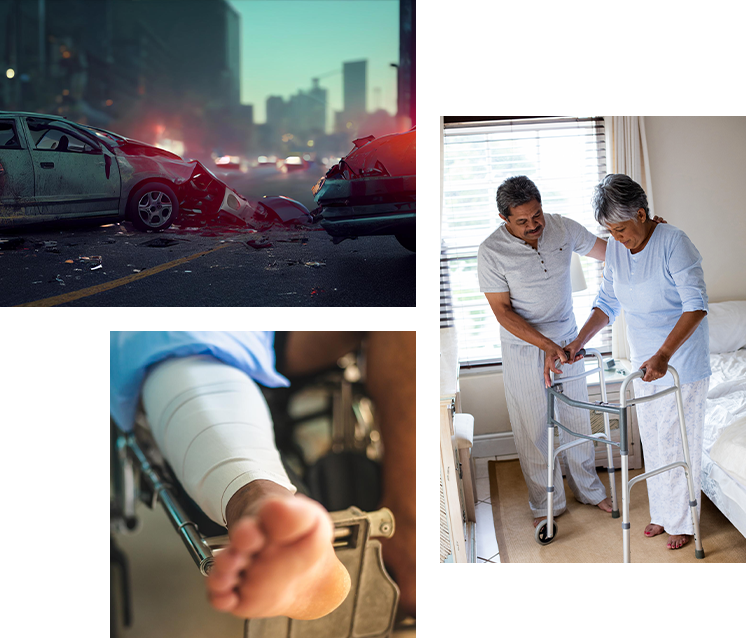If you’ve developed tinnitus following a car accident, you may be entitled to claim compensation and make a tinnitus claim. Lacey Solicitors in Belfast previously wrote about Noise Induced Hearing Loss and Tinnitus injuries. Lacey Solicitors in Belfast are experience hearing loss solicitors specialising in tinnitus claims. At Lacey Solicitors, we understand the challenges that tinnitus brings, and our expert team is dedicated to helping you secure the compensation you deserve. Contact us for a free consultation and let us guide you through the claims process with care and expertise.
Tinnitus, the perception of ringing, buzzing, or hissing in the ears, is a distressing condition that can significantly impact your daily life. For those who develop tinnitus following a car accident, the emotional and physical toll can be compounded by the trauma of the incident. If you’ve experienced tinnitus after an accident, Lacey Solicitors Injury Law Firm in Belfast is here to help you secure the compensation you deserve. Our team of experienced personal injury solicitors understands the difficulties of living with tinnitus and is ready to provide expert legal guidance.
What is Tinnitus and How Does It Relate to Accidents?
Tinnitus refers to the sensation of hearing sounds such as ringing, buzzing, or hissing without any external source. While it can vary in intensity and duration, tinnitus can have a significant effect on a person’s quality of life. It’s typically regarded as a symptom rather than a disease, and in many cases, it can be triggered by head or neck injuries sustained in an accident.
Causes of Tinnitus After a Car Accident
Tinnitus can develop after a car accident due to a variety of factors associated with the trauma of the crash. Common causes include:
-
Whiplash: A sudden, jerking motion of the head and neck, often seen in rear-end collisions, can lead to whiplash. This injury can disrupt blood flow and nerve function related to the auditory system, which can cause tinnitus.
-
Traumatic Brain Injury (TBI): A direct blow to the head or severe shaking can cause brain injuries that damage the auditory pathways, leading to tinnitus.
-
Exposure to Loud Noises: Accidents often involve loud noises, such as the deployment of airbags or the crash itself. These noises can damage the delicate hair cells in the inner ear, which can cause both hearing loss and tinnitus.
-
Pressure Changes: During rapid deceleration, the pressure change in the ear can cause damage to the eardrum or other structures in the middle and inner ear, potentially leading to tinnitus.
-
Physical Damage to the Ear: In some cases, accidents can cause cuts, fractures, or other injuries to the ear, including damage to the eardrum or cochlea, which can result in tinnitus.
-
Stress and Anxiety: Emotional distress following an accident can exacerbate tinnitus. Anxiety often amplifies the perception of internal sounds, making the condition more noticeable.
Health Implications of Tinnitus After an Accident
Tinnitus can have wide-ranging effects on your physical and mental well-being. Common implications include:
- Sleep Disturbances: The constant noise can make it difficult to sleep, leading to fatigue, irritability, and difficulty concentrating during the day.
- Concentration Problems: The persistent sound can act as a distraction, which affects your ability to perform tasks and work efficiently.
- Mental Health Struggles: Chronic tinnitus can lead to anxiety, depression, and frustration. The condition may also result in social isolation if it prevents you from engaging in social activities.
- Physical Discomfort: Stress and anxiety associated with tinnitus can lead to physical issues such as neck and jaw pain, headaches, and tension.
What Treatments Are Available for Tinnitus?
While there is no universal cure for tinnitus, there are several treatments available that can help alleviate symptoms and improve your quality of life:
- Sound Therapy: White noise machines or tinnitus maskers can help by masking the internal sounds, making tinnitus less noticeable.
- Cognitive Behavioural Therapy (CBT): CBT can help you manage the emotional and psychological effects of tinnitus by reducing stress and anxiety.
- Tinnitus Retraining Therapy (TRT): TRT combines sound therapy with counselling to help you adjust to tinnitus and reduce the emotional distress it causes.
- Neuromodulation: A new treatment that combines sound and electrical stimulation of sensory pathways has shown promise in reducing the severity of tinnitus.
- Medications: Antidepressants or anti-anxiety medications may help alleviate symptoms. Additionally, non-medicated therapies like yoga, meditation, and mindfulness can also provide relief.
While treatments can improve the condition, for some individuals, tinnitus may be a long-term issue, especially following an accident.
How Much is a Tinnitus Claim Worth in Northern Ireland?
If you have developed tinnitus following a car accident, you may be wondering how much compensation you could be entitled to. While there is no precise formula for determining the value of a tinnitus claim, guidance is available to estimate potential compensation based on the severity of the condition.
Here’s a rough guide to compensation amounts for tinnitus in Northern Ireland:
- Mild Tinnitus: If your tinnitus is mild and doesn’t significantly interfere with your daily life, compensation can be up to £20,000.
- Moderate Tinnitus: For moderate tinnitus, where symptoms cause a moderate level of disruption, compensation can range from £20,000 to £40,000.
- Severe Tinnitus: In cases of severe tinnitus, where the condition has a significant impact on your ability to lead a normal life, compensation can range from £40,000 to £90,000.
It’s important to note that these amounts are general guidelines, and the actual compensation in any case will depend on the specific circumstances. A judge will assess your case based on their experience, training, and sense of fairness, which means compensation may vary depending on your individual condition.
In Atkinson v PSNI [2015] NIQB 92 the court was satisfied that there was mild Tinnitus and mild Hearing Loss. The Judge made an award for General Damages in the sum of £18,500.00. Compare this to the case of Gurney v Courtaulds Textiles (Holdings) Limited [2025] NICty 5 where the court believed that the tinnitus complained of was of a negligible nature did not believe it to be compensatable and so and made no award for tinnitus.
How Can Lacey Solicitors Help You Get Compensation for Tinnitus?
If you developed tinnitus following an accident, you may be entitled to compensation for the physical, emotional, and financial burden caused by the condition. Lacey Solicitors Injury Law Firm in Belfast can help you navigate the claims process and secure compensation for:
- Pain and Suffering: Compensation for the distress and discomfort caused by tinnitus.
- Medical Costs: Covering the cost of private treatments, therapies, and hearing aids related to tinnitus.
- Loss of Earnings: If tinnitus has affected your ability to work, you may be entitled to claim compensation for lost income.
- Future Care Needs: If you require ongoing treatment or support for tinnitus, we can help you secure compensation for future expenses.
Time Limits for Tinnitus Claims
In Northern Ireland, you generally have three years from the date of the accident or from when you first became aware of your tinnitus to make a claim. Similarly it could be argued that the three years starts from the date you first became aware of the ’cause’ of the tinnitus. E.g. Whilst you have been aware of tinnitus for the past 20 years, you might only recently have been made aware that it was due to poor PPE provided to you by your employer a decade ago. It’s essential to consult with a solicitor as soon as possible to ensure you don’t miss the deadline for your claim.
Contact Lacey Solicitors Today for Expert Legal Help
If you’ve developed tinnitus after a car accident, Lacey Solicitors Injury Law Firm in Belfast is here to help. We offer a free consultation to assess your case and guide you through the legal process.
Our team of expert solicitors is dedicated to helping you recover compensation for the suffering caused by tinnitus. Contact us using our online form today to get the legal support you need.
















